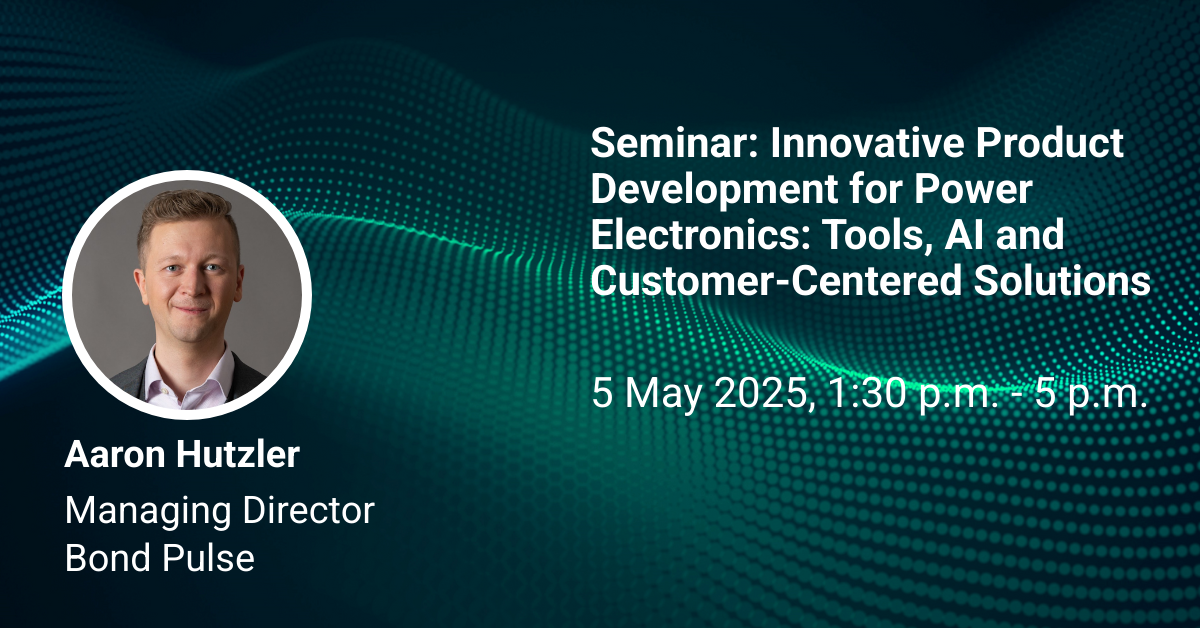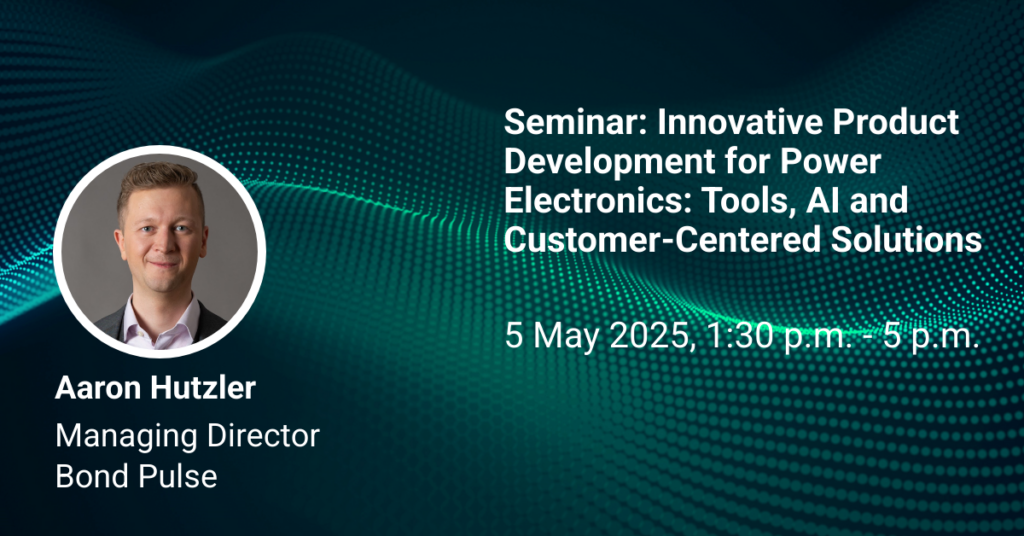
21 Mar 2025 PCIM Seminar: Innovative Product Development for Power Electronics: Tools, AI and Customer-Centered Solutions

Bond Pulse managing director Dr. Aaron Hutzler will give a seminar on Innovative Product Development for Power Electronics: Tools, AI and Customer-Centered Solutions together with Björn Noreik from BNB-Qualitätsstatistik und Training.
Date: 05.05.2025 – 1.30pm to 5pm
Location: Arvena Park Hotel Nuremberg, Germany
Registration: Link
Language: English
Synopsis
In this fast-paced, hands-on seminar, you’ll learn how to turn customer requirements into optimized products and processes. Over the course of three hours, we’ll cover key tools like the KANO Model and Quality Function Deployment QFD to help you prioritize customer needs and translate them into actionable specifications.
You’ll also explore how to apply Design of Experiments (DoE) and statistical process control (SPC) to streamline your development process, ensuring high-quality outcomes. Therefore we will bring a 3D printer to print a power module housing. As a bonus, we’ll demonstrate how AI can act as your brainstorming partner, assisting your team in finding innovative solutions and uncovering root causes. This workshop is perfect for product developers, process engineers, and quality professionals looking to quickly gain practical skills that can be applied immediately to their projects.
The general methodology will be explained independently from power electronics, but industry relevant examples will be given. Please note that we will not show how to develop power electronics but teach you on tools and methods that will enable you to develop power electronics faster and more efficiently with your team.
Workshop Highlights:
- Innovative methods: Learn key tools such as the KANO Model and Quality Function Deployment (QFD) to prioritize and translate customer needs into actionable product features.
- AI as a sparring partner: Discover how AI can enhance your brainstorming sessions, helping you identify real and potential root causes to accelerate problem-solving and innovation.
- Hands-on learning: Apply Design of Experiments and Statistical Process Control to real-world projects, including a 3D printing session that showcase the power of digitalization and process optimization.
- Interactive experience: Engage in discussions, practical case studies, and exercises designed to help you immediately apply what you learn to your own projects.
Benefits for Attendees:
- Customer-centered development: Get some ideas into the process of translating customer requirements into technical specifications that meet market demands.
- Efficient problem-solving: Use tools like the Cause&Effect Matrix to overcome development challenges with structured, innovative approaches.
- AI-powered solutions: Learn how AI can assist your team in brainstorming and root cause analysis, leading to faster, more innovative solutions.
- Optimize and innovate: See how to apply DoE and SPC to optimize processes, reduce costs, and enhance product quality.
Who Should Attend:
This workshop is designed for product developers, process engineers, quality professionals, and project managers who want to enhance their skills in product and process optimization. Attendees should have a foundational understanding of engineering, product development, and quality management systems.
Why Attend:
- Real-world application: Learn from real case studies and engage in hands-on exercises, including a 3D printing project that demonstrates the full product development lifecycle.
- Expert-led sessions: Benefit from expert guidance in applying advanced tools and methodologies like Measurement System Analysis (MSA), DoE and SPC.
- Future-ready skills: Equip yourself with AI-driven insights to stay ahead in a competitive market, ensuring faster, smarter decision-making.
Agenda:
Introduction (15 minutes)
- Welcome and Objectives
- Brief introduction of the workshop’s goals and expected outcomes
- Overview of the agenda
- Participant introductions and icebreaker to understand their expectations
Part 1: Understanding and Prioritizing Customer Requirements (35 minutes)
- Topic: Customer-Centered Product Development
- Explanation of the KANO Model and SWOT Analysis
- Activity: Group discussion on customer requirements, using a power module
Outcome: Prioritized list of customer needs.
Part 2: Translating Requirements into Technical Specifications (45 minutes)
- Topic: Tools for Product Development
- Ishikawa, C&E Matrix and QFD
- Ideas and methods how to translate customer needs into measurable technical parameters
- Activity: Mini-case study using an Ishikawa and C&E Matrix
- Introduction to using AI in brainstorming and problem-solving sessions
Outcome: Defined input factors to archive technical specifications based on customer needs
Break (10 minutes)
Part 3: Design of Experiments (DoE) and Process Optimization (60 minutes)
- Topic: Experimentation and Process Control
- Overview of Design of Experiments (DoE) and its role in process and product development
- Activity: Interactive case study applying DoE at 3D printing a housing for power modules
Outcome: Optimized process parameters for a selected case.
Part 4: DoE AI as a Sparring Partner in Brainstorming and Root Cause Analysis (30 minutes)
- Topic: Importance of verifications experiments, calculating tolerances, leveraging AI for Innovation
- Ways for calculating tolerance intervals
- Using AI in brainstorming and problem-solving sessions
Outcome: Identified innovative solutions and potential root causes for a given problem.
Part 5: Conclusion and Q&A (15 minutes)
About PCIM
The PCIM Europe is the international leading exhibition and conference for power electronics and its applications. Here, you can meet experts from industry and academia, learn about trends and developments and discover products across the entire value chain of the industry. The user-oriented seminars are an optimal platform for direct exchange with other attendees.

